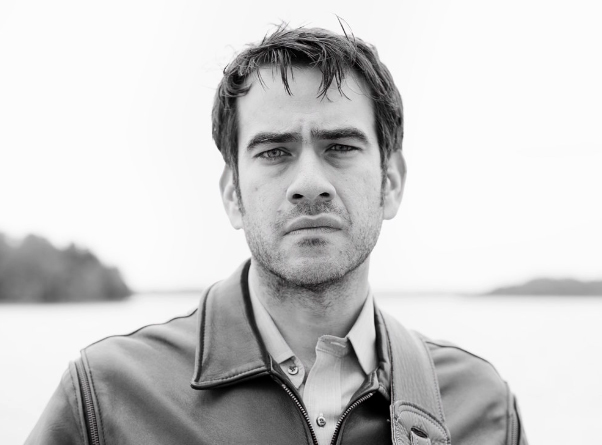By James Kent
If you found yourself at the Paramount Theatre in Rutland last Friday evening (March 28), you don’t need to read these words to know what a special time it was. For those who couldn’t make it out to see the Banjo Hall of Fame’s newest member Noam Pikelny put on a 90-minute bluegrass clinic with a little help from some amazing new friends he brought together, I’ll do my best to fill you in on an incredible night of music that still has my mind racing.
A homecoming for a Proctor native
The first 40 minutes of the night belonged to—no— they were owned by Caitlin Canty. The term “opening act” doesn’t quite have the right fit. If anything, that night’s ticket bought an audience two acts that could easily be the headliner. Canty, who originally hails from neighboring Proctor, had a community of fans in attendance, and her hauntingly beautiful voice pierced through the crowd to let all know she appreciated the love and support.

Caitlin Canty
Canty’s blend of folk and Americana grabs you at the core of your soul. Her stripped-down approach, brilliant voice, and guitar were more than enough sound to fill Paramount Theatre. Her lyrics, which spin tales of an America searching for its heart amid the trails and switchbacks of Vermont, make it clear that Canty is a representative of mountain music—Green Mountain Music, that is. Her songs are accessible to all, yet bear enough of a mark of the state she came from to ring a unique truth in the hearts of the hometown audience that night.
This evening was not Canty’s first time at the Paramount, and in between songs, she told stories of her debut years ago as a last-minute addition opening act for Eric Burden and the Animals.
Canty’s husband, Noam Pikelny, joined her for several final songs in her set. Pikelny, wielding a resonator steel guitar instead of his banjo, joked that he was now his own opening act. The chemistry of the pair made it clear to any observer that fate brought these two gifted musicians together.
From the Green Mountains to the Smoky Mountains
After a brief intermission, Pikelny took the stage with four other musicians for a master class in Bluegrass musicology. While not Pikelny’s regular group, the Punch Brothers, these musicians (or friends as Pikelny called them) were assembled by him to play a few regional shows. In what was the most shocking admission by Pikelny, until a few days before, none of them had all played together. But the tightness in the performance that evening would have you swearing up and down that Noam Pikelny was pulling our legs. It is nearly confounding that musicians playing so harmoniously could only have just started playing together a few days ago.
The musicians themselves are all seasoned bluegrass masters of craft. Jake Eddy, who plays guitar, showed up on stage with a guitar that, by all appearances, was a nice, solid, ordinary acoustic instrument. But Eddy made fools of anyone who judges a guitar by its fancy looks because his lightning-fast fingers tore up that instrument and created sounds so rich, it seemed unfathomable that it was coming from that guitar. Oh, but it was.
Julian Pinelli on the fiddle was in perfect sync with the fellas, as was double bassist Dan Klingsberg. And then there was Teo Quale on mandolin.
Pikelny stumbled upon Quale at a performance camp in California in 2024, and after hearing Quale play Friday night, it’s understandable why Pikelny wanted the opportunity to perform with Quale.
Quale, who just turned 21 on March 31, may look like a kid still in high school, but he plays the mandolin as if he’s been at it for decades. Watching Quale’s total dominance over his instrument stood out in the many moments of sheer delight listening to Pikelny and his friends. I couldn’t tell you how long Quale’s been playing or how many hours of practice he’s put in, but this is a musician with one hell of a career ahead of him. Trust me: if you hear his name come up, and he’s playing somewhere near you, don’t ask questions—just be there.
And then, there’s the man himself, Noam Pikelny. Watching him pick away at the banjo with the tactile effortlessness of the master he’s known for was a treat. And Pikelny displayed a musician’s generosity, giving each of his new friends ample moments to shine on solos.
I can’t say I’m an expert on bluegrass music or that I recognized all of the songs Pikelny and my friends played that night. In some ways, it made the evening more magical for me. Each tune was its own surprise, taking me on a journey and exploration in sounds that harked back to other times and other places, yet with an immediacy of the now that was still accessible. In my conversation with Pikelny a couple of weeks back, he said that one of the things that he loved about bluegrass music was the community, and after experiencing it for myself, I understood. On stage, Noam Pikelny and friends were more like a family of musicians bound together by the bluegrass community. And for one night of unforgettable music, I was part of that, too. As I walked out of the theater that night, I overheard two people talking. The one man said to his friend, “Wow, that was even more than I expected.” His friend replied, “You said it.” I concur.



